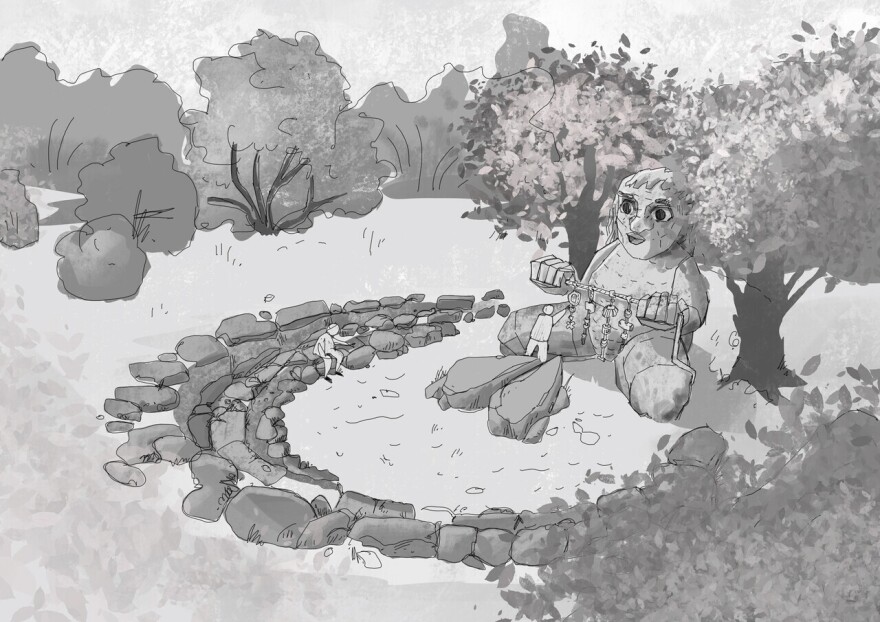I am sitting on the back of a golf cart driving around Ninigret Park in Charlestown, Rhode Island. Thomas Dambo, a world-renowned recycle artist, activist, and troll builder is driving. One of his lead builders, Bardur, is sitting next to him. These two Danes are both at least 8 inches taller than me. I feel like a hobbit trying to film a documentary about the “Fellowship of the Ring.”

We’re on our way to a secret location inside the park where Dambo and his team are building “Greta Granite,” one of the trolls he has gained global notoriety for. When we arrive at the secret spot, it’s just a hollowed-out circle surrounded by bare trees, a few leaves popping up with the early signs of spring.
Thomas looks around for a moment and then sits on the ground with his legs criss-crossed. He closes his eyes and starts positioning his body in various ways. I think he’s trying to figure out how Greta should be sitting. So I ask.

“I’m thinking about exactly how high up this should be or how much it covers. (If) the troll comes too much back then the necklaces will fall onto their knees,” he says. “So I’m just thinking about exactly what is the placement of all those things.”
It’s one part physics and two parts imagination. This is what I was able to experience over the three weeks Dambo and his team built the two trolls you can now see at Ninigret Park. It is expected that more trolls will be built around Rhode Island. But for now, “Greta Granite” and “Erik Rock” are the Ocean State’s first.

“I love big stones. In Denmark we don’t have any big bedrock and we don’t have big stone(s) just poking out (of) the ground,” Dambo is explaining to me when pointing out the boulders surrounding Greta. “So I thought there was a good basis for a fairy tale.”
We hop back on the golf cart and head to the first location, where “Erik Rock” is being built. This is in a much more obvious location at the park, just down the road from the Frosty Drew Observatory. Thomas asks if I can get my camera out so he can talk to me about something that happened with the wood they’ve been using for Erik.

“I just wanted to explain because it’s two things that are really important to me,” he says as he starts walking toward the troll-in-progress, “I don’t just judge my sculptures for what they look like. I’m a recycle art activist, so it’s really important for me that they are made of recycled wood. As you can see, this is wood straight off the shelf in the lumber yard.”
Apparently the wood Dambo and his team initially received was new, but it is supposed to be recycled. They remedied the issue and found recycled wood to use for the rest of the build, but this gets to the heart of Dambo’s purpose for his work.

“A sculpture could look super, super beautiful, but then if we only managed to make it partially out of recycled wood, that’ll tear at my integrity as a recycle artist and that’ll really annoy me,” he says.
I visited Dambo and his team to film their progress each of the three weeks they built Greta and Erik. It’s a real joy to be able to spend so much time on a story.
I watched Dambo navigate his ever-growing schedule as his work became more popular. From phone calls with reporters to site surveys for future projects, filming for his own YouTube channel, preparing for speaking events and finding time to be with his wife Alexa and their 2-year-old twin sons, the one thing he seems to have the least amount of time for is actually building these trolls.
“I love to build. That’s why I’ve started making something that requires so much building,” Dambo says. “That’s a feeling that I have all the way back from when I was 8 or 9 years old when we were making treetop houses and digging underground caves and putting zip lines up in the forest and stuff like that. (Now) I only get to use half my time building or something like that.”

Dambo feels fortunate to have long-lasting partnerships with his lead builders, Bardur, Julian and Jacob. They execute his plan and visions for each troll so he can fulfill the obligations that now come with being Thomas Dambo.
“I don’t know if my peak as an artist is today, but today is definitely more successful than yesterday in terms of how big the media is and how many people go to see my art, how many employees I have, how big the budgets are and (things) like that,” he says. “And to be able to do that when I’m turning 45 this year, that’s just so extremely nice to be able to do. That makes me really, really happy and also feel really, really spoiled.”
Ross Lippman is an Arts and Culture Producer and Photojournalist at Rhode Island PBS.


